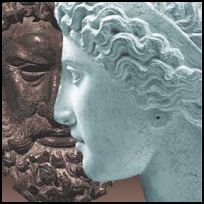Antigone: the primacy of conscience on the law
Οὐ γάρ τί μοι Ζεὺς ἦν ὁ κηρύξας τάδε,
οὐδ’ ἡ ξύνοικος τῶν κάτω θεῶν Δίκη·
οὐ τούσδ’ ἐν ἀνθρώποισιν ὥρισαν νόμους·
οὐδὲ σθένειν τοσοῦτον ᾠόμην τὰ σὰ
κηρύγμαθ’ ὥστ’ ἄγραπτα κἀσϕαλῆ θεῶν
νόμιμα δύνασθαι θνητὸν ὄνθ’ ὑπερδραμεῖν.
Οὐ γάρ τι νῦν γε κἀχθές, ἀλλ’ ἀεί ποτε
ζῇ ταῦτα, κοὐδεὶς οἶδεν ἐξ ὅτου ‘ϕάνη.
But for me it was not Zeus to proclaim the ban,
nor the Justice, dwelling with the demons
of the underworld, enacted such laws for men.
And I did not deem that your edicts had such force,
that a mortal should transgress the
unwritten and steadfast laws of the heaven.
In fact, their life is not of to-day or yesterday, but
from all time, and no one knows when they were first put forth.
This is an excerpt from Antigone of Sophocles, when the woman, turning to King Creon who asked why she had disobeyed his laws, says that they, being enacted by men, cannot have any priority over those established by gods, much higher and sacred.

Wishing to interpret this ancient Greek tragedy in a modern take, Antigone puts the king an important question whose answer is still reason for debate and confrontation: what law is more important, the moral one, that is, what we feel right, or the written one, that is, what is formally considered legal? And again, obvious corollary of the just posed question: a law must always be respected even when it is considered unfair, or should we always follow our conscience even when it contradicts the written law?
The ancient Romans said «Dura lex, sed lex», that is, the law is harsh but it is the law. For them, the answer is clear: the written law must always be respected even when it is considered unfair, apart for fighting so that it is modified or deleted. As long as this does not happen, however, it still has the priority not only on the individual’s conscience but also on people’s one.
It is not futile debate. We must not think that unjust laws are exclusive only to dictatorships and authoritarian states where the will of the people is subjugated to that of a oligarchic and undemocratic political class. In all democracies there are profoundly unjust or simply wrong laws. Very often they are not changed for laziness or simple for lack of knowledge on the part of public opinion. For example, some laws strongly affect only some minorities who, for historical or cultural reasons, are not sufficiently protected. Thus, the majority does not bother to change them while the minority does not have the numbers to do so.

The question that Antigone arises however, goes deeper: if the single individual considers that a particular law goes against his/her principles, should he/she respect it? Keep in mind that Antigone accepts the penalty for having committed what, from the point of view of Creon, is a crime. However reiterates his choice and not go back one step. What would you do in her place?
Obviously we are not dealing with laws of secondary importance, since we are talking about principles: imagine a highly discriminatory law or that provides for a punishment out of all proportion, in your opinion, in the face of the act performed. A law that takes away your children without having done anything to deserve it, or that prevents you from being with a loved one due to a prejudice, or simply that denies you what to others is allowed only for who you are or you believe to. In front of such a law, what would you do? A law that will force you to do what you considered wrong, or that prevents you from doing what it is right for you … would violate it?
I do, without thinking twice.




















Ciao Dario.
Condivido “in astratto” il tuo pensiero che, in linea di principio, non fa una piega, ma credo che, se mi dovessi trovare nella condizione di metterlo in pratica… ci penserei non solo due o tre, ma una decina di volte!
Il rischio di non rispettare qualche legge palesemente “ingiusta” (forse e’ meglio definirla iniqua, dal momento che, essendo stata varata da chi amministra la giustizia, nasce “giusta” d’ufficio) e’ di passare dalla parte del torto.
Tornando all’esempio del vedersi sottrarre i figli o eventuali soluzioni altrettanto gravi, il mancato rispetto di quella legge, potrebbe farci cadere dalla padella alla brace: violando la legge, si compie ufficialmente un reato, e si rischia di essere perseguiti penalmente, perdendo di fatto gli eventuali diritti che ancora ci spetterebbero se l’avessimo rispettata e avessimo cercato, con armi “legali”, di combattere per riottenere cio’ che la legge iniqua ci aveva sottratto.
Grazie per l’attenzione e complimenti per l’ottimo blog.
Un saluto.
Sandro